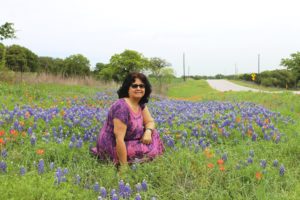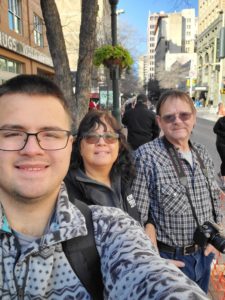by Laschwanna Muhammad
“I was 28 years old when I learned my diagnosis by accident,” Dolores recalled. She and her husband were undergoing infertility treatments and after an MRI, she was informed that she had agenesis of the corpus callosum (ACC).
It was a moment of clarity when Dolores received her diagnosis. The neurologist was surprised that Dolores had even finished high school not to mention working full time and driving a car. He told her, ‘certain things that you can’t do right now, be okay with it because you’ve come a long way already.’
 Dolores spent much of her life unaware of her condition. Her father was a special education teacher who jokingly said that “God had messed up and forgotten to give Dolores and her twin brother equal doses of everything.” Her brother was happy-go-lucky, artistic, and much more social than her. Dolores was always the shy nervous one who struggled in school.
Dolores spent much of her life unaware of her condition. Her father was a special education teacher who jokingly said that “God had messed up and forgotten to give Dolores and her twin brother equal doses of everything.” Her brother was happy-go-lucky, artistic, and much more social than her. Dolores was always the shy nervous one who struggled in school.
Dolores attended Catholic school where she studied and got good grades, but she was always considered to be a person who kept to herself. Dolores was described as, “very slow and not focused” on her kindergarten report card. Her older siblings were frustrated with her and would often accuse her of daydreaming.
After her diagnosis, Dolores said her brothers and sisters did not want to believe it. As children they argued over apparent differences in Dolores’ behavior. Dolores’ father would often remind the family that everyone is unique, everyone is different. “He would stress that ‘Dolores doesn’t have to be like everyone else, Dolores can just be Dolores.’”
Thanks to a Facebook support group Dolores has been able to share information that has helped her family understand more about the diagnosis.
 Dolores overcame her challenges by teaching herself to compensate. She learned to allow herself more time to accomplish tasks. She also spent time repeating new tasks over and over until she got it right.
Dolores overcame her challenges by teaching herself to compensate. She learned to allow herself more time to accomplish tasks. She also spent time repeating new tasks over and over until she got it right.
Dolores credits her mother and father for her success, “I never really gave up because my parents never put any of us down. My parents did not baby me. My parents treated me like everyone else.”
Dolores received an associate degree and works as a special education paraprofessional. She is the mother of three sons, one who is no longer with us. She lives in Austin, Texas where she owns her home and spends time hiking. At the age of 59, Dolores is now looking forward to her retirement.
This story is part of the Adults with DCC series that showcases the abilities and lives of real adults living with disorders of the corpus callosum. Students at The University of Texas at Arlington interviewed and wrote stories for this series.

